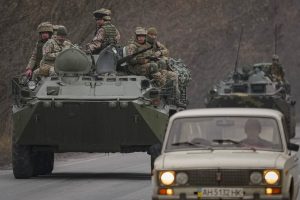On the face of it, the Russian invasion of the whole of Ukraine that began on Thursday morning could seem a distant conflict for Southeast Asia. Ukraine’s trade with the Association of Southeast Asian Nations (ASEAN) is paltry, and Russia’s trade was only worth $18.2 billion in 2019, making it the bloc’s ninth-largest outside trading partner. Neither Moscow nor Kyiv are major investors in the region. Russia, after years of promising to look east, only really has close contact with Vietnam and, since last year’s coup, with Myanmar’s military junta, to which it sells weapons.
Nonetheless, the invasion of a healthy democracy, and the first war on European soil for decades, will have global ramifications. Japan, a key Southeast Asian partner, will be on standby to monitor Russian activity near the Sea of Japan and the Sea of Okhotsk. Just this month, the Russian military engaged in military exercises in the country’s Far East. Tokyo has already joined Western democracies in imposing sanctions on Russia, as has South Korea, Seoul announced on Thursday.
Southeast Asian governments have been noticeably quiet on this issue. For them, all eyes will be on China. The war now taking place in Ukraine will further divide democracies and authoritarian regimes. It may, if the West can get its act together, embolden their resolve against hostile and tyrannical regimes. Should their sanctions work against Moscow, it could also embolden how Western democracies tackle democratic sliding and human rights violations in other parts of the world. (In Southeast Asia, that means Cambodia and Myanmar, and possibly the Philippines.)
For months, analysts have spilled a considerable amount of ilk speculating on how a war in Ukraine could bring Moscow and Beijing closer together. More worrying that if Western sanctions on Russia were to fail to deter Moscow’s aggression – a possibility in the short term – then Beijing might be emboldened to act on its threat to invade Taiwan or escalate its pressure in the South China Sea.
The Chinese Communist Party will also be closely watching what sort of sanctions democracies impose on Russia. Beijing could reasonably assume that it would suffer the same sanctions if it tried to invade Taiwan. Yet, by Western governments imposing sanctions on Russia now, it would give Beijing some breathing room to adapt, making itself more resilient if the West was to impose similar sanctions on China sometime in the future. As such, all this could make China less vulnerable to Western measures.
But this war shouldn’t only be seen as consequential for Southeast Asia only because of what the outside world does to the region. The outcome in Ukraine matters greatly for national sovereignty and the international order, a clear concern of Southeast Asians, according to the 2022 State of Southeast Asia report that was published last week by Singapore’s ISEAS-Yusof Ishak Institute. To the question “Who do you have the strongest confidence in to provide leadership to maintain the rules-based order and uphold international law?” the United States came top with 36.6 percent.
Of the 58.1 percent of respondents who said they do not trust China to “do the right thing” to contribute to global peace, security, prosperity, and governance, just under half said their main reason was because “China’s economic and military power could be used to threaten my country’s interests and sovereignty.” Some 77.3 percent of respondents stated that “China should respect my country’s sovereignty and not constrain my country’s foreign policy choices.”
Southeast Asian governments ought to be concerned that a major power thought it could so blatantly undermine national sovereignty, even in the face of a united Western response. How can the Vietnam, Malaysia, or the Philippines not see this as a major threat to the international order – and, indeed, directly undermine their belief that international law will protect their own sovereignty?
For the immediate moment, Southeast Asian governments will be keen to get their nationals out of Ukraine. Some embassies have likely begun that process. We can expect to soon see debates on this at the United Nations, where Southeast Asian representatives will be expected to vote on a likely censure motion against Russia. Their stance will be remembered by Washington and Brussels. Remembered, indeed, the next time Vietnamese or Filipino or Indonesian vessels are harassed in the South China Sea. Times of crisis are when allies are revealed.

































